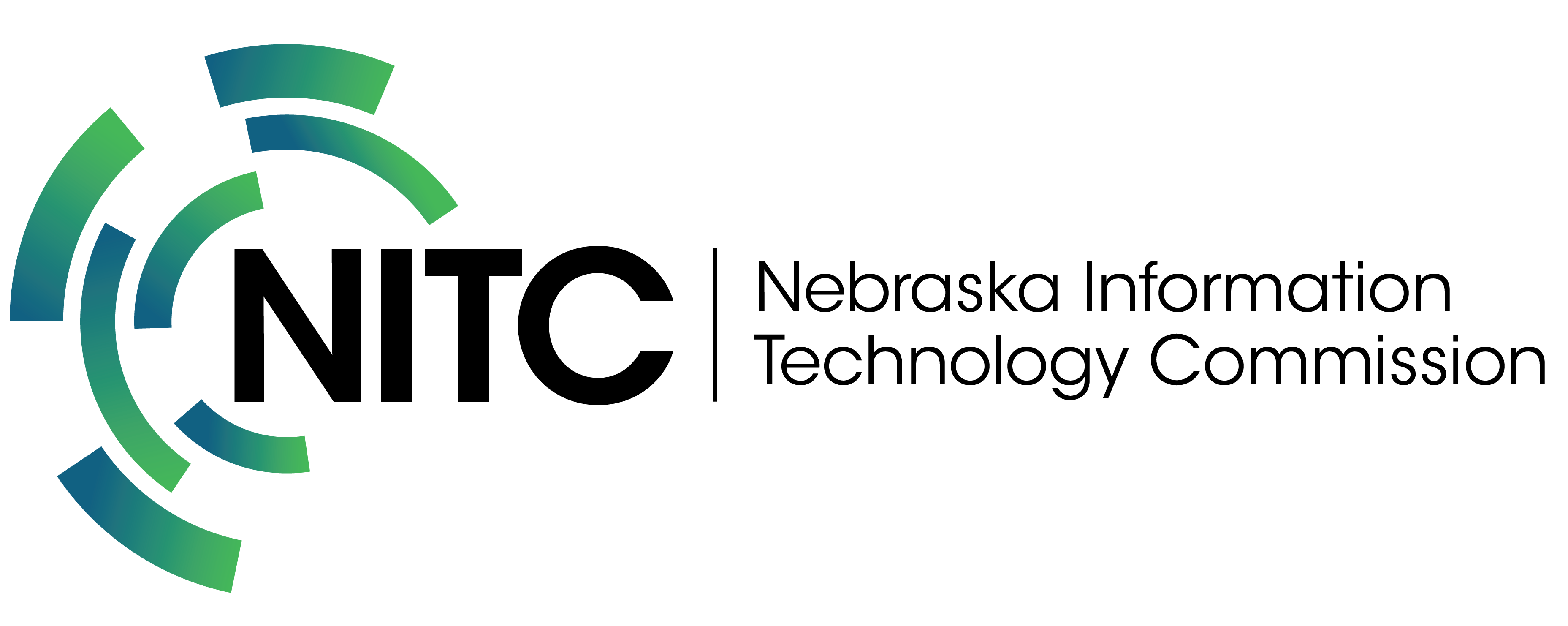Information Resources Cabinet
Minutes of the September 10, 1997 Meeting
IRC Members Present: Kim Robak, Lieutenant Governor |
Others Present: Rod Armstrong, State Information Technology Coordinator |
Century Date Change – Project Director’s Report
Project Director Steve Henderson provided an update on the CDC project. Questions were raised about comments made in the newspaper by a University of Nebraska official regarding the state’s progress. Bill Miller said he felt the comments were taken out of context, and he would discuss the matter with the University official.
Lt. Governor Robak asked about the status of work with the Dept. of Labor. Steve Henderson said that a set of guiding principles had been agreed upon with DOL, and that he feels DOL’s needs can be accommodated by CDP and CTA. Berri Balka commented that cooperation among agencies, CDP and CTA has improved.
Dorest Harvey asked about the total cost of the CDC project. Steve Henderson said the total contract cost is $16.7 million. Dorest asked if costs to the state such as personnel were being tracked. Steve replied that 5 state personnel are devoted to the project, but that costs outside the contract are not being tracked.
Lt. Governor Robak asked if systems outside the scope of the CTA contract are CDC compliant. Steve Henderson responded that CDP is not aware of the extent to which non-contract systems may have CDC problems, but that CDP is attempting to act as an information broker. Berri Balka pointed out that the systems in question are not the responsibility of CDP, but of the individual agencies.
Century Date Change – Property Tax Administrator Proposal
Property Tax Administrator Cathy Lang-Morrissey presented a proposal to utilize Information Technology Infrastructure Funds that had been allocated for repair of the County Administered Property System (CAPS) toward a replacement system.
Mike Calvert asked if training and replacement equipment had been considered in the proposal. The goal is to avoid unanticipated deficits. Cathy responded that these items had been included.
Lt. Governor Robak asked Steve Henderson if he recommended approval of the proposal. Steve recommended approval in the amount of $461,936, equal to the amount of ITIF funds specified in the Interagency Agreement between CDP and the Property Tax Administrator.
A motion was made by Berri Balka, seconded by Don Leuenberger, to approve the proposal. The motion carried unanimously.
Cost Data Report
Rod Armstrong presented the most recent cost figures for state government information technology expenditures. He explained that the figures represented the total for all funds for Fiscal Year 1996-97. Work will continue with the DAS Budget Division, Legislative Fiscal Office and agency budget staff to arrive at final figures as soon as possible.
Dorest Harvey asked what percentage of the state’s total operations budget was represented by technology expenditures. Mike Calvert responded that adjustments need to be made for aid payments to arrive at a total operations budget figure to which technology expenditures can be compared. Don Leuenberger suggested that research be conducted to identify percentages from other states to provide a benchmark for Nebraska.
Standards
Rod Armstrong briefly described work done by the state of North Carolina on a wide variety of technology standards. Larry Primeau commented that North Carolina has a commission similar to the IRC that is relatively strong, and suggested that Nebraska’s IRC needs to be set in statute.
The Cabinet discussed whether or not a consultant should be sought to develop standards for Nebraska. Doug Christensen commented that an individual without a vested interest is needed.
Lt. Governor Robak asked Tom Conroy to review the North Carolina work and make recommendations regarding the scope of work that should be undertaken in Nebraska, a timeline for completion, and options for enforcement.
Acceptable Use Policy
Rod Armstrong informed the IRC that the Governor’s Office does not intend to issue an Executive Order to implement the AUP adopted last November, but rather defer to the IRC’s action as an expression of official state policy. The Governor intends to send copies of the AUP and other policies adopted by the IRC to all agencies, boards and commissions.
Cellular Telephone Policy
Bill Miller presented a proposed policy on cellular telephones. A motion to adopt the policy was made by Don Leuenberger, seconded by Al Abbott. The motion passed unanimously.
Policy on Electronic Publishing
Lt. Governor Robak presented a draft policy on the use of electronic publishing to replace paper reports. Larry Primeau commented that IRC action in this area would leverage change.
Gerry Oligmueller pointed out that the Nebraska Library Commission, through Nebraska Publications Clearinghouse, is responsible for obtaining copies and cataloging reports published by state agencies. This responsibility could extend to electronic publications as well. Bill Miller commented that the State Records Board may also have a role in this area.
David Powers suggested language changes to make the policy more promotional rather than directive. He also suggested additional language to encourage reductions in the size of mailing lists and the number of paper copies produced (language changes are incorporated into the final policy adopted by the IRC).
A motion to approve the policy as amended was made by Larry Primeau and seconded by Doug Christensen. The motion was approved unanimously. Lt. Governor Robak asked Rod Armstrong to explore ways to measure progress toward the policy’s objectives.
Networking Policy Statement
Bill Miller presented a draft policy statement on networking. The draft was developed by a working group established at an earlier IRC work session.
Lt. Governor Robak asked for a definition of "telecommunications." Bill Miller defined telecommunications as essentially any medium that allows a signal to be transmitted from one point to another. In response to a question from Al Abbott, Bill said that the definition includes two-way radio.
David Powers raised questions about contextual language that accompanied the policy statement. The language referred to agreements reached by the working group:
"It was also agreed that the statutes in place for NETC and DAS Division of Communications along with the appropriation language in LB 386 allow these agencies to work on the telecommunications infrastructure. The University of Nebraska Central Administration is recognized as a full partner to the discussions on telecommunications infrastructure."
David Powers proposed that the following language to be added to the minutes as additional context for the networking policy statement:
"The growing role of the State Colleges, the Community Colleges, and the needs of K-12 should be recognized in planning this infrastructure."
"Consideration should be given to expanding the membership of NETC to include greater representation for K-12, the State Colleges, the Community Colleges, and the Coordinating Commission for Postsecondary Education."
A motion was made by Doug Christensen, seconded by Dorest Harvey, to approve the networking policy statement, with additional context included in the minutes. The motion was approved unanimously.
Electronic Mail Policy
Lt. Governor Robak revisited a decision made at the last IRC meeting to charter a task force to develop options for an enterprise-wide, integrated electronic mail system. She expressed her desire to alter the charge to the task force, saying that the most feasible option for state government was to standardize on 3 to 4 of the market leaders in electronic mail, and pursue the most cost-effective means to integrate them into a seamless network.
The task force should focus their attention on identifying the top e-mail packages and the cost to maintain those systems and connect them. She asked Tom Conroy to reconvene the task force with the new focus, and to bring recommendations for action in November that would include costs and a conversion schedule. There was no objection to the revised approach from other IRC members.
Personnel Recruitment/Retention
Mollie Anderson provided the IRC with a report on information systems personnel recruitment and retention issues in state government (link).
Larry Primeau said that the State of Missouri is focusing on retraining current workers into information systems skill sets, as opposed to competing with the private sector for trained personnel. Lt. Governor Robak said that school-to-work is another possible avenue to secure trained workers.
Mollie Anderson said that a final white paper on the issue should be available within 30 days. The objective is to create a "compelling needs" story, and case studies are needed for documentation. Lt. Governor Robak asked that any agencies with potential case studies forward that information to Mollie.
CIO/IRC Structure
A new working draft of the concept paper on IRC structure was distributed. The paper will be the subject of discussion at the next IRC meeting.
Activity-Based Costing
Al Abramson briefed the IRC on activity-based costing. He indicated that it is difficult to determine the cost of providing services for which agencies like DMV are responsible. He plans to set up a presentation by a consulting firm familiar with activity-based costing, and invited agencies to participate.
Next Meeting
The next IRC meeting was scheduled for Wednesday, September 24th at 1:30 in Room 1113 of the State Capitol. The only agenda item will be continued discussion of the CIO/IRC Structure issue. The meeting adjourned at approximately 4:00 p.m.
meeting minutes
